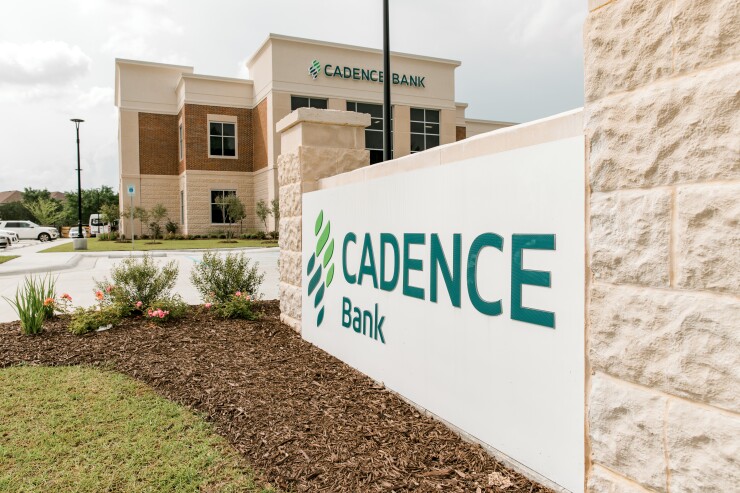
Cadence Bank in Tupelo, Mississippi, has received the highest possible rating on its latest Community Reinvestment Act evaluation — a notable stamp of approval by its regulators after alleged lending discrimination by a bank that it acquired in 2021.
The $51.7 billion-asset bank announced Tuesday that it received an "outstanding" rating in its most recent performance evaluation by the Federal Deposit Insurance Corp.
"This is a team sport, and if the whole team is not doing what they need to be doing, then you won't get an outstanding rating," CEO Dan Rollins said in an interview. "And I think an outstanding rating is a big win for us."
Cadence emerged in 2021 from the merger of two banks that had both reached settlements with the Department of Justice during the previous half-decade in connection with alleged lending discrimination.
The acquiring bank, Mississippi-based BancorpSouth, reached a consent order with the Justice Department and the Consumer Financial Protection Bureau in 2016. The government had alleged that BancorpSouth engaged in redlining several years earlier in connection with its mortgage business.
In the months after that consent order was signed, BancorpSouth's overall CRA rating from the FDIC dropped from "satisfactory" to "needs to improve." The rating rebounded to "satisfactory" in 2018 and stayed there in 2020.
In April 2021, BancorpSouth announced a deal to acquire Houston-based Cadence Bancorp., along with plans to operate the combined bank under the Cadence brand.
Four months later, the Texas bank
Then in October 2021, the merger between BancorpSouth and Cadence was completed. While the acquiring bank changed its name to Cadence, it kept the FDIC as its primary federal regulator.
Last year, Cadence and the National Community Reinvestment Coalition announced
In an interview Wednesday, Rollins said that last year's community benefits plan was not a factor in the bank's recent "outstanding" rating from the FDIC.
"There's nothing in that agreement that we weren't already doing," he said. "That agreement is a public statement that says, 'Here's what we're doing.'"
When asked about the consent order that the Texas-based predecessor bank reached with the DOJ and OCC in 2021, Rollins said: "My experience with the regulators is, they look to the acquiring institution."
"And they obviously were pleased with what we were doing, or they wouldn't have let the merger go through," he added.
In a press release, Rollins expressed pride in the accomplishments of Cadence's employees. The bank said that the FDIC gave its lending performance a "high satisfactory" rating, while its investments and services both received "outstanding" scores.
"This recognition from the regulators is a testament to our unwavering dedication to promoting economic growth and advancing financial inclusion, particularly in the low- and moderate-income communities we serve," he said.
The Community Reinvestment Act of 1977 encourages banks to meet the credit needs of the communities in which they operate. CRA ratings can be a factor in the approval of proposed mergers and acquisitions.
Ken Thomas, a consultant who specializes in the Community Reinvestment Act, commended Cadence for achieving an "outstanding" rating. He noted that fewer than 10% of all banks earn the highest possible CRA score.
But Thomas also said that there are typically negative consequences for a bank's CRA rating after a lending discrimination violation — like the one that Houston-based Cadence incurred shortly before it was acquired by the Mississippi bank. If the predecessor bank had survived, it would have received a downgrade on its CRA performance in the OCC's next examination, he said.
"When a bank is in fair lending violation, a serious one like this, they always get a one-level downgrade," said Thomas, the president of Community Development Fund Advisors.
The FDIC's evaluation report is expected to be released publicly later this summer. An FDIC spokesperson did not comment on the rating that Cadence received, but said that the agency's evaluation did not take into account the OCC's 2021 consent order with the predecessor bank.
The spokesperson noted that the consent order involved a bank that no longer exists, and also said that it covered an earlier period than the time frame for which the Mississippi-based bank's CRA performance was evaluated.






